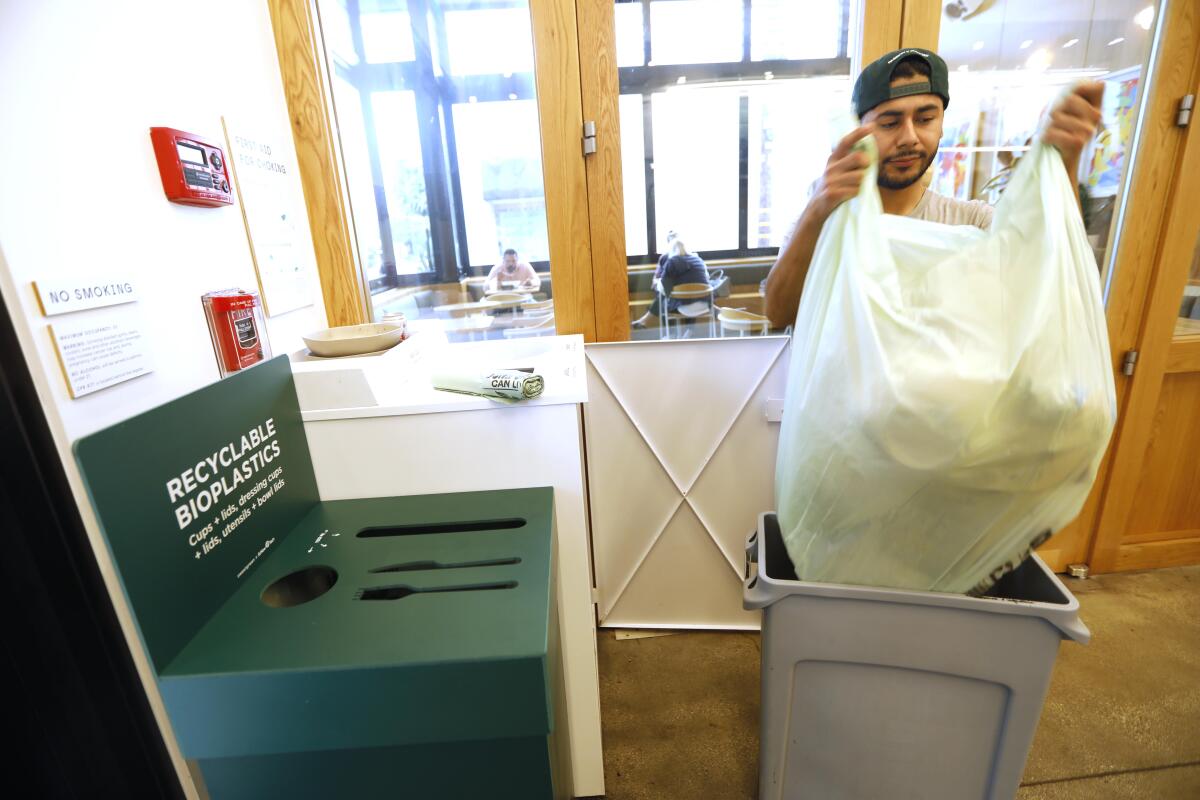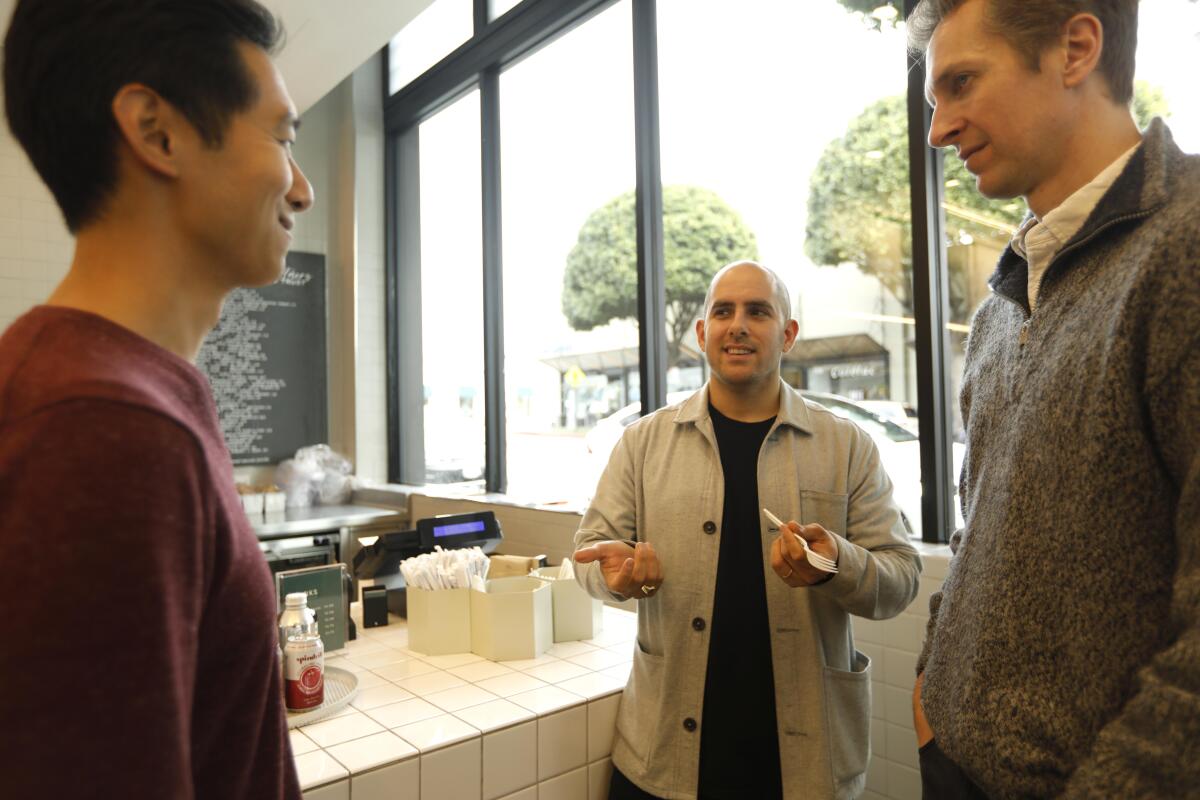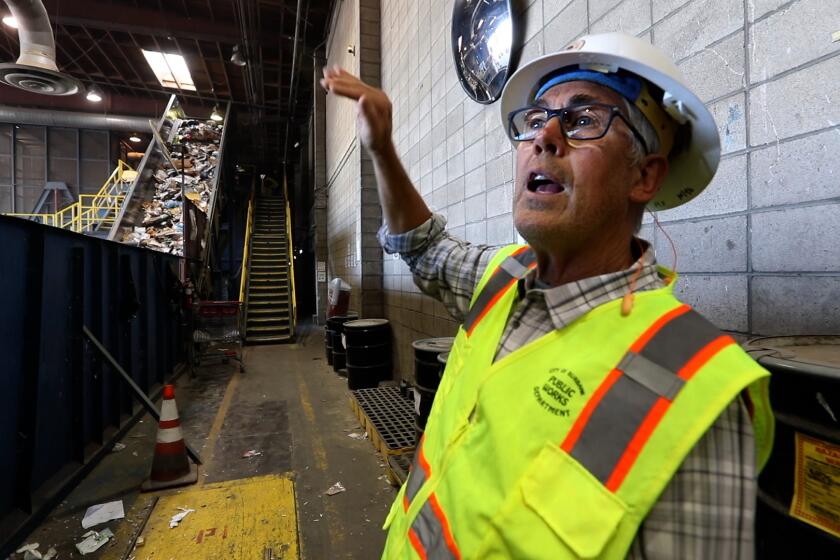Your $14 salad’s not as eco-friendly as advertised — but Sweetgreen’s trying

- Share via
In the summer of 2016, Sweetgreen executive Kevin Quandt got a confidential tip about something rotten that was going on inside his company’s restaurants. Or, to be more precise, about something rotting that was going out of them: garbage.
As vice president of supply chain and sustainability, Quandt was in charge of sourcing ingredients that went into the Santa Monica-based fast-casual chain’s salads and grain bowls, as well as its takeout containers, disposable cutlery and cups. He was also in charge of what happened to all the waste collected in Sweetgreen’s then-80 locations, most of it consisting of food scraps, paper and compostable bioplastic.
Since 2010, in-store signs have assured diners “Nothing from inside Sweetgreen goes to the landfill.” But for most of the time since, that hasn’t been entirely true. In many of the company’s biggest markets, municipal composting was and is nonexistent. Even where it was available, composters often refused to handle bioplastics, forcing the company to come up with its own solutions, of sometimes dubious efficacy.
In New York City, the company employed a broker to collect the organic waste from seven restaurants and truck them to a facility upstate. Then an industry friend put a bug in Quandt’s ear: Are you sure this guy’s really taking your compost where he says he is? Quandt ran the tip past another trusted contact, who agreed the vendor was not to be trusted.
California’s recycling industry has struggled since China banned imports of plastics and other material. Experts say changes are vital to overcome a waste glut.
It was the kind of red flag Quandt had been encountering more and more often as he went about the Sisyphean task of auditing the company’s waste operations, a project he’d begun shortly after joining Sweetgreen from the meal-kit start-up Blue Apron in 2016. Quandt dialed up the broker, who freely admitted he’d been tossing Sweetgreen’s green waste into trash dumps.
“So we worked to phase them out,” Quandt says. “Sometimes you think you have what you should be doing, but then you keep digging deeper and you learn all sorts of things.”
The same could be said for the millions of customers who pay $10 to $15 a pop for Sweetgreen salads and grain bowls, telling themselves that money buys not just a healthy meal but one that’s good for the world — the ingredients organically grown and locally sourced, the workers fairly treated, the packaging minimal and eco-friendly, just weeks away from returning to soil. That’s been the chain’s premise since 2007, when co-founder Nicolas Jammet and two of his Georgetown University classmates, Jonathan Neman and Nathaniel Ru, opened their first location in Washington, D.C. It now has more than 100, with plans to double that number over the next three years, and took in more than $300 million in revenue last year.
Backed by $478 million in venture capital, Sweetgreen has lately been experimenting with delivery-only “ghost kitchens” and non-bowl food items, but always within certain parameters. In posters and social media postings, the brand touts its corporate values of transparency, sustainability and animal welfare. “We’re always looking for ways to source smarter, to make better decisions and to help Sweetgreen and its customers be a positive force in the world and on the food system,” the company says on a page of its website titled “Our Food Ethos.” Sweetgreen has won attention for innovative human resources policies such as providing five months of paid parental leave to all employees and an emergency-cash fund for line workers.
But privately, its executives acknowledge how hard it can be to live up to its ideals, particularly when it comes to garbage. The fragmented nature of waste management systems, the dearth of facilities that process bioplastics and the many tradeoffs around price and sustainability have made it difficult at times for Sweetgreen to match its rhetoric, or even know when it was failing to.
For about six months beginning in late 2017, the company was stuck using non-certified compostable salad bowls after learning the company that supplied them had added petrochemicals to its formulation. Sweetgreen solved that problem in 2018 by eliminating plastic salad containers and adopting bowls made of molded sugarcane fiber for all its offerings. But in 2019, the New Food Economy reported that the molded-fiber bowls tested positive for polyfluoroalkyl substances, or PFAS, a potentially hazardous and non-biodegradable chemical compound. (Sweetgreen says it’s working on a better permanent solution.)
That promise about nothing from inside Sweetgreen going to landfill? For most of the time Sweetgreen’s been touting it, it was more of an ambition than a guarantee. It wasn’t until 2018 that Quandt identified the last restaurant treating its compost as trash — a store in Philadelphia whose landlord refused to make space for an extra trash container in the basement — and figured out a solution, which required a courier coming to the store daily for a choreographed curbside handoff. “We had to get really creative,” Quandt says.
In a broader sense, it’s still far from true, since most takeout containers, by design, leave the premises — at which point they’re overwhelmingly likely to end up in the trash. Only about 5% of U.S. households have access to curbside food waste collection, according to Cheryl Baldwin, vice president at Pure Strategies, a sustainability consulting firm. And even where it exists, the majority of composting facilities don’t accept bioplastics, which are made from cornstarch and other plant sugars.
“It’s taken a lot of work for us to get to where we are today,” says Jammet, who holds the title of chief concept officer. “There’s only so much that’s technically in your control.”
Exerting more control over its waste flows is the goal of a first-of-its-kind pilot program taking place at four Sweetgreen locations in Los Angeles. In November, the company introduced new dedicated bins for the collection of cups, cutlery and salad bowl lids. The materials gathered in them gets trucked to a facility in Albany, Ore., where they are cleaned, shredded, ground, melted and, finally, shaped back into new utensils, which Sweetgreen purchases.
In the first six weeks of this pilot, the company captured materials equivalent to 7,400 cups or 15,000 forks. A given piece of polylactic acid, or PLA, can go through this “closed loop” process more than 10 times before its quality degrades, at which point it can be composted.
The pilot resulted from an unsolicited email Quandt received in late 2018 from a company called EcNow Tech. A plastics engineer who worked for HP’s ink-cartridge division, Chris Vitello founded EcNow in 2009 after growing concerns over “all the materials in my career I’d send to landfill,” he says.

For the first eight years, he focused on making plant-based and recycled plastics. He only turned his focus to recycling PLA — which has to be processed separately from conventional, petroleum-based plastics — in response to two factors: the reluctance of most commercial composters to accept bioplastics, which take much longer to break down than food or yard waste and yield poorer-quality composts, and the rising price of PLA, which is in short supply thanks to new regulations and its embrace by industries eager to project a greener image.
“We realized it’s a shame to send those valuable raw materials to the compost or the landfill,” Vitello says. He started small, with a local organic bakery, then went looking for a big customer that could help him prove the concept at scale.
For Quandt, Vitello’s outreach came at an opportune moment. In August 2018, the Santa Monica City Council had passed a law requiring all single-use restaurant materials to be “marine degradable,” a term that excludes both petroleum-based and plant-based plastics. The ban took effect in July 2019. Enforcement is complaint-based; as of the end of November, the city had issued only four citations.
A spokeswoman for the city calls Sweetgreen’s efforts to capture its plastic waste “good news” but notes it does not address the issue of carry-out items. But the program could make the company a less tempting target for enforcement. And even if not, Quandt says, “we think it’s the right thing to do.”
Plus, the price is right. Sweetgreen buys the recycled utensils from EcNow Tech at about the same cost it was paying its previous supplier. If the pilot goes smoothly, the next step will be for EcNow Tech to build a satellite facility in the Los Angeles region so it can process materials collected there locally and skip the carbon-intensive 2,000-mile round trip.
Longer term, the hope is to phase out the PLA, paper and sugarcane fiber Sweetgreen now uses in its containers and utensils in favor of even greener materials that break down more cleanly or don’t require scarce resources. The company is studying the feasibility of replacing the paper in its drinking straws with kelp, says Joshua Hu, supply chain manager in charge of packaging and innovation. Wood pulp is also promising, he says.
The hardest part may be finding a suitable replacement for cups. Sweetgreen eliminated plastic water bottles in 2017, but it still uses PLA cups for cold beverages, and Hu hasn’t seen a potential non-plastic alternative.
Beyond corporate responsibility, sustainable packaging is a key selling point for the sorts of people who buy fancy salads. “Consumers care more and more about it today than ever,” Jammet says. “Because it’s something everyone touches, right?”
Rising consumer awareness creates its own set of problems, however, with ever more players attempting to cash in on the boom by blurring the distinctions between biodegradable, compostable and certified compostable. The latter designation means it has been tested by the Biodegradable Products Institute, or BPI, and will break down in no more than 120 days in an industrial composting facility. “Biodegradable” merely means it will decompose over 100 years.
When the company realized it was using salad bowls that weren’t fully compostable, Quandt says, “we were, like, panic button, because that’s not where we want to be.” It wasn’t until August 2018 that Sweetgreen had a solution, adopting new molded-fiber bowls that had the additional benefit of eliminating the need for mixing bowls. Despite those nothing-to-landfill signs, that’s where every salad bowl went for months to avoid contaminating other compost, according to Ryan Cooper, waste division manager and organics recycling lead at Rubicon Global, Sweetgreen’s waste management partner.
“There’s a lot of greenwashing out there,” Jammet says. “It’s frustrating, and it works.”
But once those BPI-certified bowls and sporks enter the green bin, it’s out of sight, out of mind for the average consumer — and the average business, too. And haulers know it. To be sure that Sweetgreen’s waste contractors weren’t all dumping compost into a landfill such as the one in New York, Quandt had to individually audit the waste stream at each one of the chain’s 80 locations. As leases came up for renewal, he was able to insert clauses requiring landlords to provide organic waste trash containers — a provision that often enabled Sweetgreen neighbors to begin composting as well. Just as important is making sure the trash bins are secure enough so their contents don’t become adulterated with non-compostable refuse.
Now, when the company scouts locations for new stores, “path of trash” is one of the first factors it considers, Quandt says. “This isn’t just ‘put in a bin and we’re done,’” he says. “We’re fighting a lot of forces here.”
It’s a fight that never ends. Because of the “big black box of waste management services,” as Quandt puts it, the only way to be sure the trash ends up where it’s supposed to is to follow it from source to destination, which means periodic reinspections of every restaurant.
Quandt wishes there were some kind of third-party certification of waste brokers and haulers to take the onus off him.
“At this point, we all just have to take their words for it, which is kind of crazy,” he says. “I just want to sleep at night knowing, after all this work, the truck isn’t just going to the dump.”








